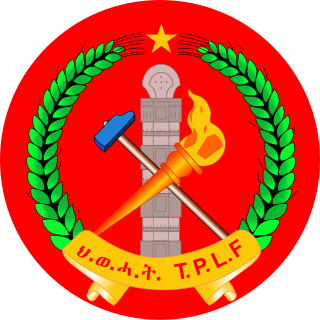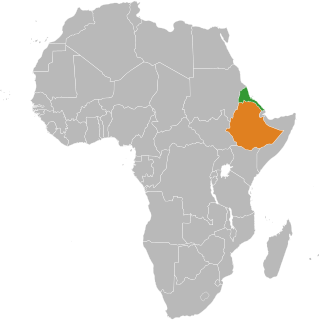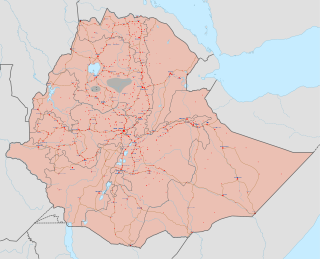Related Research Articles

Isaias Afwerki is an Eritrean politician and partisan who has been the first and only president of Eritrea since 1993. In addition to being president, Isaias has been the chairman of Eritrea's sole legal political party, the People's Front for Democracy and Justice (PFDJ).

The Tigray People's Liberation Front, also known as the Tigrayan People's Liberation Front, is a left-wing ethnic nationalist, paramilitary group, and the former ruling party of Ethiopia. It was classified as a terrorist organization by the Ethiopian government during the Tigray War until its removal from the list in 2023. In older and less formal texts and speech it is known as Woyane or Weyané.

Ethiopian nationalism, also referred to as Ethiopianism or Ethiopianness, according to its proponents, asserts that Ethiopians are a single nation, and promotes the social equality of all component ethnic groups. Ethiopian people as a whole regardless of ethnicity constitute sovereignty as one polity. Ethiopian nationalism is a type of civic nationalism in that it is multi-ethnic in nature, and promotes multiculturalism.

Abiy Ahmed Ali is an Ethiopian politician who is the current Prime Minister of Ethiopia since 2018 and the leader of the Prosperity Party since 2019. He was awarded the 2019 Nobel Peace Prize "for his efforts to achieve peace and international cooperation, and in particular for his decisive initiative to resolve the border conflict with neighbouring Eritrea". Abiy served as the third chairman of the Ethiopian People's Revolutionary Democratic Front (EPRDF) that governed Ethiopia for 28 years and the first person of Oromo descent to hold that position. Abiy is a member of the Ethiopian parliament, and was a member of the Oromo Democratic Party (ODP), one of the then four coalition parties of the EPRDF, until its rule ceased in 2019 and he formed his own party, the Prosperity Party.

Relations between Eritrea and Ethiopia have been historically adversarial. Eritrea gained independence from Ethiopia in 1993 after the Eritrean War of Independence, after which relations were cordial. Since independence Eritrea's relationship with Ethiopia was entirely political, especially in the resuscitation and expansion of IGAD's scope. However, the 1998 Eritrean–Ethiopian War marked a turning point, and their relationship became increasingly hostile.

The 2018 Eritrea–Ethiopia summit was a bilateral summit that took place on 8–9 July 2018 in Asmara, Eritrea, between Eritrean President Isaias Afwerki and Ethiopian Prime Minister Abiy Ahmed and officials from the two countries.

The Prosperity Party is a ruling political party in Ethiopia that was established on 1 December 2019 as a successor to the Ethiopian People's Revolutionary Democratic Front by incumbent Prime Minister Abiy Ahmed.

The Tigray war was an armed conflict that lasted from 3 November 2020 to 3 November 2022. It was a civil war that was primarily fought in the Tigray Region of Ethiopia between forces allied to the Ethiopian federal government and Eritrea on one side, and the Tigray People's Liberation Front (TPLF) on the other.
This timeline of the Tigray War is part of a chronology of the military engagements of the Tigray War, a civil war that began in the Tigray Region of Ethiopia in early November 2020.
Arena Tigray or Arena Tigray For Democracy and Sovereignty is an Ethiopian political party based in the Tigray Region and participating in the Medrek coalition federally.

The Tigrayan peace process encompasses the series of proposals, meetings, agreements and actions that aimed to resolve the Tigray War.

The ongoing Ethiopian civil conflict began with the 2018 dissolution of the Ethiopian People's Revolutionary Democratic Front (ERPDF), an ethnic federalist, dominant party political coalition. After the 20-year border conflict between Ethiopia and Eritrea, a decade of internal tensions, two years of protests, and a state of emergency, Hailemariam Desalegn resigned on 15 February 2018 as prime minister and EPRDF chairman, and there were hopes of peace under his successor Abiy Ahmed. However, war broke out in the Tigray Region, with resurgent regional and ethnic factional attacks throughout Ethiopia. The civil wars caused substantial human rights violations, war crimes, and extrajudicial killings.
Operation Alula Aba Nega, commonly shortened to Operation Alula, was a counter-offensive during the Tigray War by the Tigray Defense Forces against the Ethiopian military and its allies in Tigray. The operation was named after Ethiopian general Ras Alula Aba Nega, who was of Tigrayan descent. The offensive was launched on 11 June 2021 and recaptured vast swaths of territory across central and eastern Tigray, including the regional capital of Mekelle.

The OLA insurgency is an armed insurgency between the Oromo Liberation Army (OLA), which split from the Oromo Liberation Front (OLF) in 2018, and the Ethiopian government, continuing in the context of the long-term Oromo conflict, typically dated to have started with the formation of the Oromo Liberation Front in 1973.
This Timeline of the Tigray War is part of a chronology of the military engagements of the Tigray War, a civil war that began in the Tigray Region of Ethiopia in early November 2020.

Abiy Ahmed is currently the third serving Prime Minister of Ethiopia. In 2018, he became the first ever Oromo descent to assume the role of prime minister in the history of Ethiopia. He won the Nobel Peace Prize in his second year as a prime minister of Ethiopia in 2019 becoming the eighth African laureates to win the award for peace.
The 1995 Ethiopian Federal Constitution formalizes an ethnic federalism law aimed at undermining long-standing ethnic imperial rule, reducing ethnic tensions, promoting regional autonomy, and upholding unqualified rights to self-determination and secession in a state with more than 80 different ethnic groups. But the constitution is divisive, both among Ethiopian nationalists who believe it undermines centralized authority and fuels interethnic conflict, and among ethnic federalists who fear that the development of its vague components could lead to authoritarian centralization or even the maintenance of minority ethnic hegemony. Parliamentary elections since 1995 have taken place every five years since enactment. All but one of these have resulted in government by members of the Ethiopian People's Revolutionary Democratic Front (EPRDF) political coalition, under three prime ministers. The EPRDF was under the effective control of the Tigray People's Liberation Front (TPLF), which represents a small ethnic minority. In 2019 the EPRDF, under Abiy, was dissolved and he inaugurated the pan-ethnic Prosperity Party which won the 2021 Ethiopian Election, returning him as prime minister. But both political entities were different kinds of responses to the ongoing tension between constitutional ethnic federalism and the Ethiopian state's authority. Over the same period, and all administrations, a range of major conflicts with ethnic roots have occurred or continued, and the press and availability of information have been controlled. There has also been dramatic economic growth and liberalization, which has itself been attributed to, and used to justify, authoritarian state policy.

Since the start of Tigray War in November 2020, the Eritrean government has been heavily involved in the war against the Tigray People's Liberation Front (TPLF) in support of the Ethiopian government.

The Ethiopia–Tigray peace agreement, also called the Pretoria Agreement or the Cessation of Hostilities Agreement (CoHA), is a peace treaty between the government of Ethiopia and the Tigray People's Liberation Front (TPLF) that was signed 2 November 2022, wherein both parties agreed to a "permanent cessation of hostilities" to end the Tigray war. The agreement was made effective the next day on 3 November, marking the second anniversary of the war.
Anti-Eritrean sentiment is a broad opposition, bias, discrimination and hatred against Eritrea, its government and people. Anti-Eritrean attitude is prevalent amongst Tigrayan elites, who were crucial parts for downfall of the Derg regime in 1991. The 1998 border war exacerbated their relations as both parties accused each other for the territorial claims. Eritrean involvement in the Tigray War further aggravated anti-Eritrean feelings amongst Tigrayans.
References
- 1 2 3 Plaut, Martin (6 September 2018). "Text of Eritrea, Ethiopia and Somali agreement". Eritrea Focus . Archived from the original on 12 February 2021. Retrieved 12 February 2021.
- ↑ "News: Second tripartite meeting between Eritrea, Ethiopia and Somalia to take place in Amhara regional state". Addis Standard . 8 November 2018. Archived from the original on 12 February 2021. Retrieved 12 February 2021.
- ↑ "Ethiopia, Eritrea and Somalia adopts 2020 joint plan". Fana Broadcasting Corporate . 27 January 2020. Archived from the original on 12 February 2021. Retrieved 12 February 2021.
- ↑ Shaban, Abdur Rahman Alfa (6 September 2018). "Ethiopia, Eritrea, Somalia pact boost for regional peace, devt: EU". Africanews. Retrieved 22 June 2024.
- ↑ Plaut, Martin (23 January 2021). "What are the war aims of Ethiopia, Eritrea and Somalia in Tigray?". Eritrea Hub . Archived from the original on 12 February 2021. Retrieved 12 February 2021.
- ↑ Goitom Gebreluel (10 May 2021). "The tripartite alliance destabilising the Horn of Africa". aljazeera.com . Wikidata Q126881858. Archived from the original on 13 November 2022.